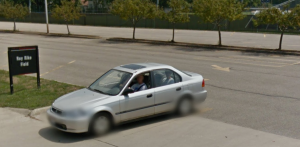
This story was updated on Sept. 17 with additional information.
Keeping a car on Ohio Wesleyan’s campus is now almost twice as expensive.
Students who want a B-level permit, which provides access to most residential lots, will have to pay $175 for the upcoming academic year, according to a Public Safety statement released July 30. The B permit cost $100 last year.
So far, though, the number of B passes issued are almost three times greater than the number of C passes: 434 to 153. The strategy involved raising B permits from $100 to $175 and C permits from $10 to $15.
The price of a C-level permit also increased from $10 to $15 for parking in lots further removed from residential buildings, such as those near the Jay Martin Soccer Complex, Beeghly Library and Selby Stadium.
The penalties for breaking OWU’s parking rules will also be steeper this year. Parking ticket fines are increasing from $20 to $30 for cars with permits and to $50 for cars without permits. Public Safety will put boots on the fifth violation for permitted cars and on the third violation for those without permits. Those drivers will have to pay $75 to get the boot removed, which cost $50 last year.
The hikes is an effort to reduce crowding both in OWU’s lots and on Delaware streets, according to Public Safety director Bob Wood. With last year’s influx of cars on campus, many students who needed B spaces often couldn’t get them. He said he hopes the cheaper C permit will divert drivers away from the crowded residential lots.
Also part of the effort is the Enterprise CarShare Program, now in its second year. Wood noted that the Delaware Area Transit Authority’s main bus hub is on Park Avenue in the center of OWU’s campus.
“We’ve got a lot of good transportation options, so we’re trying to encourage people — if you don’t need a car, why don’t you look at another way to do this?” he said.
The greater sanctions for drivers without permits is an effort to reduce crowding on Delaware streets, which has prevented residents from parking near their houses, Wood said. Public Safety will be stepping up enforcement of its requirement of all OWU students with cars to buy a permit.
Many students reacted negatively to the increase. Senior Emma Buening said she couldn’t afford a $175 B pass.
“I don’t even have books that cost that much,” she said. “I would have to get so many tickets from DPD for it to be worth it that it’s not.”
She only rarely parks on campus, and then for just as long as needed.
“If there was a cheaper option – if it was $40 or $50, I would think about it,” Buening said, adding that C lots were far away. “A C Pass, where can I even park? Selby?”
Sophomore Nicole Barhorst said the higher parking cost makes it more burdensome for her to travel home each month to visit her sick grandparents and the girl she mentors through Big Brothers Big Sisters.
“I absolutely need my car to spend time with these very important people, yet every year it gets much less affordable to bring one to campus,” she said on Facebook.
Wood said he and other administrators compared the university’s parking prices to those at similar schools and found OWU’s were cheaper. But even with the additional $75 per permit, he said, there’s still a gap in maintenance costs, which are between $800 and $1,500 per space.
Sophomore Brian Burnett suggested Public Safety prohibit freshmen from having cars on campus or keep them to the C lots, which OWU used to do. The policy changed last year, when B and C lots both opened to all students.
Managing Editor Spenser Hickey contributed reporting to this story.
